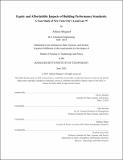| dc.contributor.advisor | Sterman, John | |
| dc.contributor.advisor | Patten, Bethany | |
| dc.contributor.author | Shepard, Allison | |
| dc.date.accessioned | 2023-08-23T16:11:00Z | |
| dc.date.available | 2023-08-23T16:11:00Z | |
| dc.date.issued | 2023-06 | |
| dc.date.submitted | 2023-07-17T15:19:25.731Z | |
| dc.identifier.uri | https://hdl.handle.net/1721.1/151817 | |
| dc.description.abstract | Building operations account for more than two-thirds of emissions in most U.S. cities. To reduce emissions from the building sector, cities and states are adopting Building Performance Standards. These laws require large buildings to comply with increasingly stringent emissions or energy limits, or otherwise pay a fine. Building Performance Standards are powerful decarbonization tools, but may inadvertently over-burden and increase the risk of displacement for low-income households. The risk is particularly acute in unsubsidized affordable housing, also known as naturally occurring affordable housing, where building owners can pass the costs of compliance or non-compliance on to tenants. In this thesis, I quantitatively and qualitatively examine the impact of New York City’s Building Performance Standard – Local Law 97 – on multifamily buildings. I find affordable housing buildings are less energy efficient than market rate buildings and that non-compliance penalties, retrofit costs, and increased energy costs from electrification may substantially increase housing costs for tenants who are already severely rent burdened and energy burdened. To prevent low-income households from shouldering these costs and to ensure they benefit from the other results of building decarbonization – such as health improvement and job creation – cities and states should provide financial and technical assistance, protect tenants, and incorporate flexibility for affordable housing owners to comply with Building Performance Standards. | |
| dc.publisher | Massachusetts Institute of Technology | |
| dc.rights | In Copyright - Educational Use Permitted | |
| dc.rights | Copyright retained by author(s) | |
| dc.rights.uri | https://rightsstatements.org/page/InC-EDU/1.0/ | |
| dc.title | Equity and Affordability Impacts of Building Performance Standards: A Case Study of New York City’s Local Law 97 | |
| dc.type | Thesis | |
| dc.description.degree | S.M. | |
| dc.contributor.department | Massachusetts Institute of Technology. Institute for Data, Systems, and Society | |
| dc.identifier.orcid | https://orcid.org/0009-0008-4733-0839 | |
| mit.thesis.degree | Master | |
| thesis.degree.name | Master of Science in Technology and Policy | |
